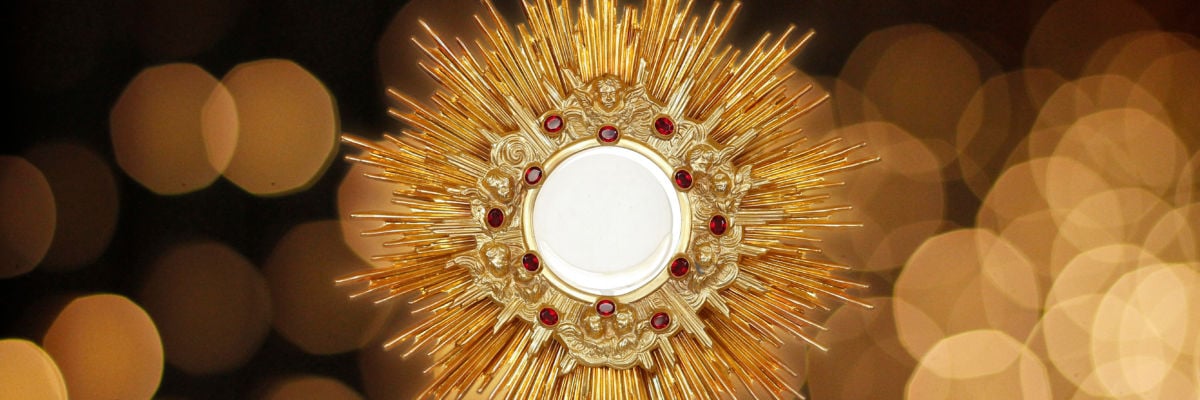
Episode 29: Year A – The Solemnity of the Body and Blood of the Lord
In this episode of the Sunday Catholic Word, we reflect on the readings for this upcoming Solemnity of the Body and Blood of the Lord. There are two details that we focus on. The first comes from both the first reading (taken from Deuteronomy 8:2-3, 14b-16a) and the Gospel (taken from John 6:51-58)—namely, the revelation that the Eucharist is the New Manna. The second detail, Paul’s teaching on participation in the body and blood of the Lord, comes from the second reading, which is taken from 1 Corinthians 10:16-17.
Looking for Sunday Catholic Word Merchandise? Look no further! https://shop.catholic.com/catholic-answers-merchandise/?q=sunday
Hey everyone,
Welcome to The Sunday Catholic Word, a podcast where we reflect on the upcoming Sunday Mass readings and pick out the details that are relevant for explaining and defending our Catholic faith.
I’m Karlo Broussard, staff apologist and speaker for Catholic Answers, and the host for this podcast.
In this episode, we’re going to reflect on the readings for this upcoming Solemnity of the Body and Blood of the Lord. There are two details that we will focus on. The first comes from both the first reading, taken from Deuteronomy 8:2-3, 14b-16a, and the Gospel, taken from John 6:51-58—namely, the revelation that the Eucharist is the New Manna. The second detail, Paul’s teaching on participation in the body and blood of the Lord, comes from the second reading, which is taken from 1 Corinthians 10:16-17.
Let’s start with the detail of the Eucharist as the New Manna. Part of the first reading from Deuteronomy 8 reads as follows:
Moses said to the people:
“Remember how for forty years now the LORD, your God,
has directed all your journeying in the desert,
so as to test you by affliction
and find out whether or not it was your intention
to keep his commandments.
He therefore let you be afflicted with hunger,
and then fed you with manna,
a food unknown to you and your fathers,
in order to show you that not by bread alone does one live,
but by every word that comes forth from the mouth of the LORD.
The Manna is clearly the focus of the passage. The Church then gives us the Gospel reading from John 6 where Jesus speaks of giving His flesh as the true bread from heaven, which is the Eucharist. And this is spoken against the backdrop of the manna of old. “Your fathers ate the manna in the wilderness,” Jesus says two verses earlier, “and they died. This is the bread which comes down from heaven, that a man may eat of it and not die . . . [v. 51] the bread which I shall give for the life of the world is my flesh.”
So, the readings for this Solemnity, and Jesus Himself, is drawing our attention to the revelation that the Eucharist is the New Manna. That’s the detail. What’s the significance?
Well, as many of you listening know, some Christians deny the Real Presence of Jesus in the Eucharist. For these Christians, the Eucharist is merely a symbol; nothing more. But, as I point out in my book Meeting the Protestant Response: How to Answer Common Comebacks to Catholic Argumetns, this revelation of the Eucharist being the New Manna proves otherwise.
How so?
Consider that the bread that God gave in the wilderness was not ordinary bread. It was miraculous bread:
- It appeared every day when the morning “dew” would burn off (Exod. 16:13).
- It never lasted more than a day, except on the Sabbath. When the Israelites didn’t obey the instruction to leave none until the next day, it “bred worms and became foul” (Exod. 16:19-20).
- But when the Israelites held it over in accordance with the Lord’s command—that is, to assure that they did no work on the Sabbath—it did not breed worms and become foul (Exod. 16:22-26).
- It appeared every day for forty years, and stopped only upon the Israelites entering the promised land (Exod. 16:35; Josh. 5:10-12).
- A jar with an omer’s worth was kept in the Israelites’ sanctuary “throughout the generations” (Exod. 16:31-34).
As Bible scholar Brant Pitre argues in his book Jesus and the Jewish Roots of the Eucharist, to say the Eucharist at the Last Supper, the new manna, is merely a symbol, we’d have to conclude that the old manna in the wilderness was superior to the new, since miraculous bread is clearly greater than ordinary bread.[i] But that’s a no-go in biblical theology. The New Testament fulfillment is always greater than the Old Testament type.
That the Eucharist is supernatural is further confirmed by Jesus’ teaching that faith is required to accept his command to eat his flesh and drink his blood. Jesus prefaces his revelation that his flesh is the bread of life by saying, “No one can come to me unless the Father who sent me draws him.” Then, after giving his discourse about eating his flesh and drinking his blood, he says, “There are some of you that do not believe. . . . This is why I told you that no one can come to me unless it is granted him by my Father.” If Jesus begins and concludes his remarks about eating his flesh and drinking his blood with faith, a gift that only the Father can give, then Jesus is revealing that faith is required to accept his teaching.
So much for the Eucharist as the New Manna. Let’s now turn to St. Paul’s teaching on the Eucharist in the second reading, which, again, is taken from 1 Corinthians 10:16-17. Paul writes,
The cup of blessing that we bless,
is it not a participation in the blood of Christ?
The bread that we break,
is it not a participation in the body of Christ?
Because the loaf of bread is one,
we, though many, are one body,
for we all partake of the one loaf.
The first thing to note is that Paul makes it clear that when we partake of the Eucharist we partake of the body and blood of Jesus. He writes,
The cup of blessing which we bless, is it not a participation in the blood of Christ? The bread which we break, is it not a participation in the body of Christ? (v.16).
How could we be sharing in the body and blood of Jesus unless his body and blood were present
Now, Paul underscores this truth in the subsequent verses (not part of the second reading) when he draws a parallel between the Eucharist and pagan sacrifices:
[W]hat pagans sacrifice they offer to demons and not to God. I do not want you to be partners with demons…You cannot partake of the table of the Lord and the table of demons (v.20-21).
If communing with demons in pagan sacrifices implies that demons are really present, then communing with the body and blood of Jesus in the Eucharist implies that his body and blood are really present.
Paul’s reference to the “table of the Lord” (v.21) also implies the real presence of Jesus in the Eucharist. If pagans offer a real victim (not a symbol) on the “table of demons”, then how much more do Christians be offering a real victim, Jesus, on the “table of the Lord?”
So, Paul believes that in the Eucharist Jesus’ body and blood is really present. He does not believe that the Eucharist is merely a symbol.
Conclusion
Well, my friends, that does it for this episode of the Sunday Catholic Word. There is much more that we could say about these Eucharistic passages. But the scope of these episodes doesn’t allow us to go any further. If you’re interested in diving deeper in John 6, I would recommend that you get a copy of my book Meeting the Protestant Response. There is a chapter that deals with the Bread of Life Discourse in John 6 with great detail.
Thank you so much for subscribing to the podcast. Please be sure to tell your friends about it and invite them to subscribe as well. Also, if you’re interested in getting some cool mugs and stickers with my logo, “Mr. Sunday podcast,” go to shop.catholic.com.
I hope you have a blessed Solemnity of the Body and Blood of the Lord.
[i] See Brant Pitre, Jewish and the Jewish Roots of the Eucharist: Unlocking the Secrets of the Last Supper (New York: Doubleday, 2011), Chap. 4; Electronic Edition.



